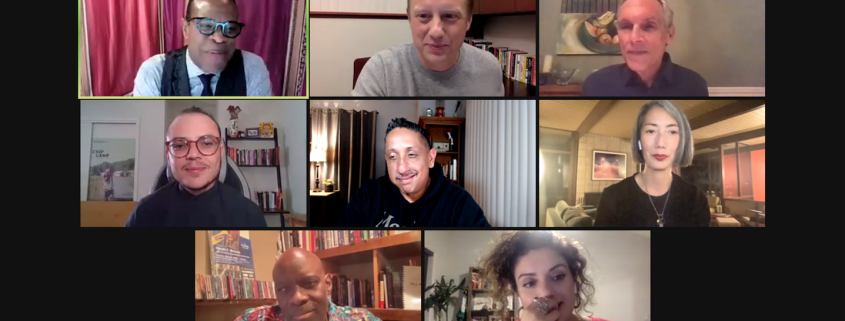Visions and Voices hosts Thomas Allen Harris

Visions and Voices and the School of Cinematic Arts hosted critically-acclaimed filmmaker Thomas Allen Harris for “Family Pictures USC: How I Got Here” Wednesday. The webinar was the first of a two-part series working with Harris and his project which connects film, photography, history and identity through family photos. Harris, who has traveled across the United States speaking to people about their heritage and community through collected photographs, brought his techniques to the USC community.
“Our methodology helps people become more understanding, empathetic and patient with our differences,” Harris said.
After an introduction to Harris’ PBS series “Family Pictures USA,” Harris spoke to nine panelists about their journeys to becoming USC faculty. Panelists included deans and professors from the School of Cinematic Arts, Dornsife College of Letters, Art and Sciences, the Office of Religious Life and the Middle East Media Initiative.
Although Visions and Voices and SCA held the event virtually, Harris and members brought palpable energy to the space. The event allowed panelists to share images that represented the path they took to get to USC and detail the meaning of those images and their different identities.
SCA Vice Dean of Academic Affairs, Michael Renov, has known Harris for more than two decades. Renov, who helped in the preliminary stages of planning this event, said “Family Pictures USC” intends to engage students by discovering unknown connections with others in the USC community.
Harris, who is also a senior lecturer of African American and film and media studies at Yale University, discussed ways audiences could learn about their family’s history and culture through photographs. The event showcased Harris and his ability to listen and guide participants when discussing their stories and connection to USC, a skill that made his work impactful and serves as a powerful tool in his filmmaking.
“This is just a way to really dig deeper and to see what we mean when we talk about identity formations,” Renov said. “[This] is a way to build bridges across cultural differences so that people realize that their own stories and their own identity formation is really very much like that of others.”
Organizers collaborated with Harris’ producers and spent time searching for USC community members who would be willing to share their family photos with Harris and the audience. Director of Programming and Special Projects at SCA Alex Ago said Wednesday’s event served as a jump off point for students to investigate their own journeys. The second part of this event, which will take place in January 2022, will parallel Wednesday’s event but will ask students instead of faculty to collect images from their journeys.
“I thought that it would probably work best if we provided the students with an introductory session,” Ago said. “Then we use that as a launchpad to put out a call for submissions to invite our students from across the University to participate in.”
During the event, Harris and a collection of USC faculty discussed ways their upbringings shaped their path to USC. Professor of music Ronald McCurdy discussed his journey with the music industry and his relationship with his parents — the driving influence that led him to become an educator. McCurdy said this event was important because it allowed students to make connections with the USC faculty.
“Sometimes students don’t necessarily know the path that faculty members have taken to get where they are,” McCurdy said. “I would imagine that being as diverse as USC is, all stories [are] very different.”
Panelist and lecturer for the Dornsife writing program, Maddox Pennington, also described their influences and background as an Indigenous person that led them to educate others. Pennington said one of the reasons why this event was so interesting was because students and faculty could discover insights about other members of the USC community.
“We’re hoping that the students will look at the experiences of the faculty and staff and administrators who are on this and realize that they can also do this work of choosing photos and looking for how your story emerges when you study them,” Pennington said.
The exercise allowed the panelists to reflect on who and what made their journeys particularly important. Before the event, McCurdy said he looked forward to displaying photographs that represent the influences that led him to USC and believes the importance of this event boils down to the people that guided you to the spaces you are in now.
“[My photos are] about mentors and people who had a tremendous impact on your life during your formative years,” McCurdy said. “So I’m excited to have a chance to share about people who were in my life, who made it possible for me to be where I am today as a professor.”
Renov said he is excited to have students go through the exact same procedure because it will give them the same opportunity to reflect.
“This is all about the very process of investigating people’s family histories in their memories through their family photographs,” Renov said. “We would all be better off if we took a look back and thought and reflected a little bit about how we came to be the people that we are.”

